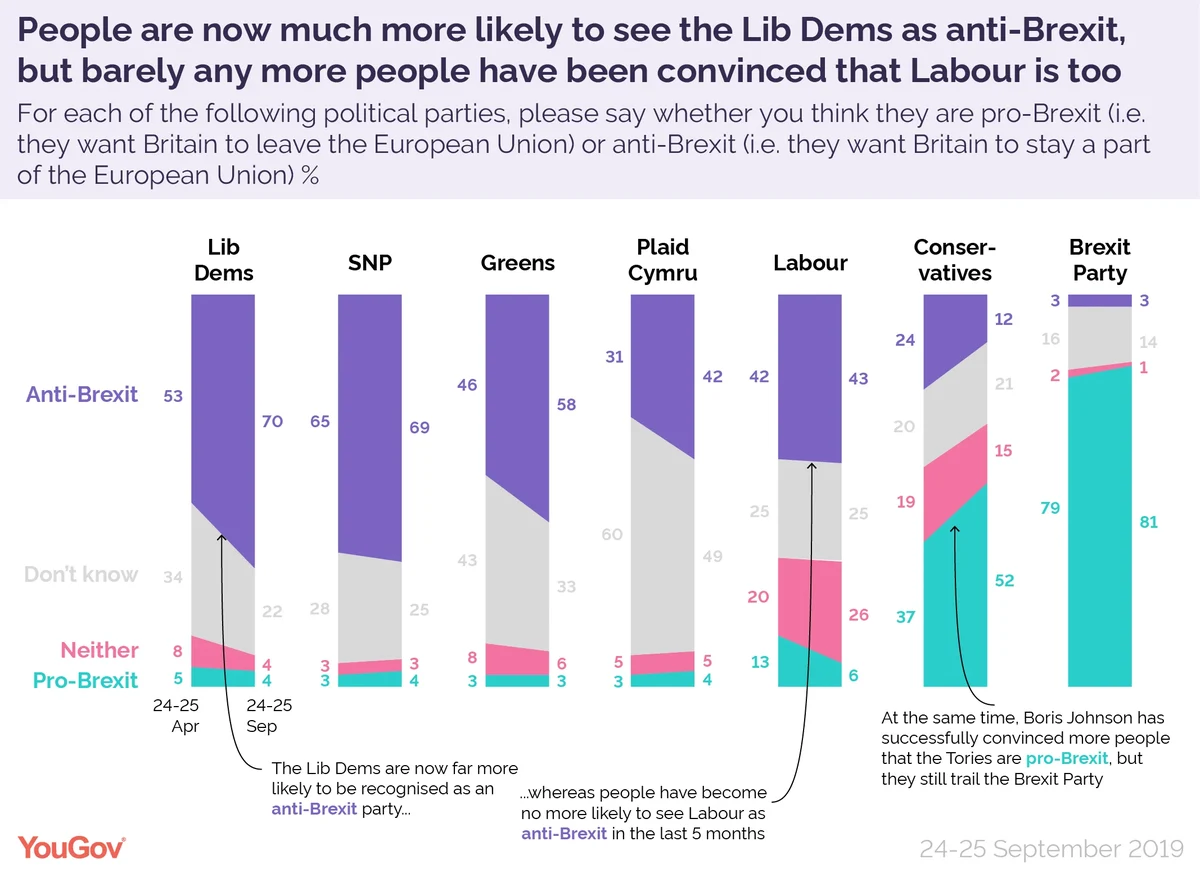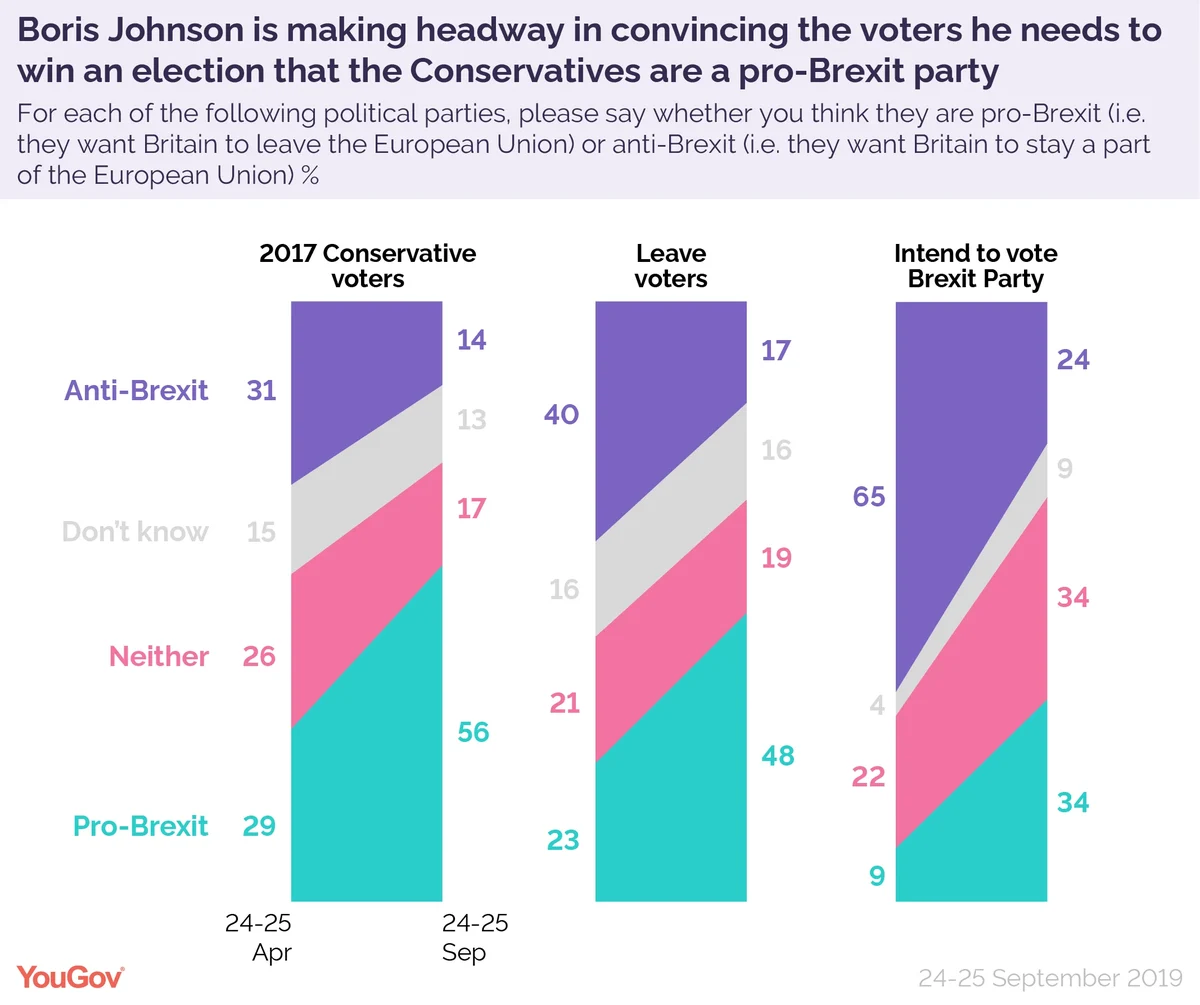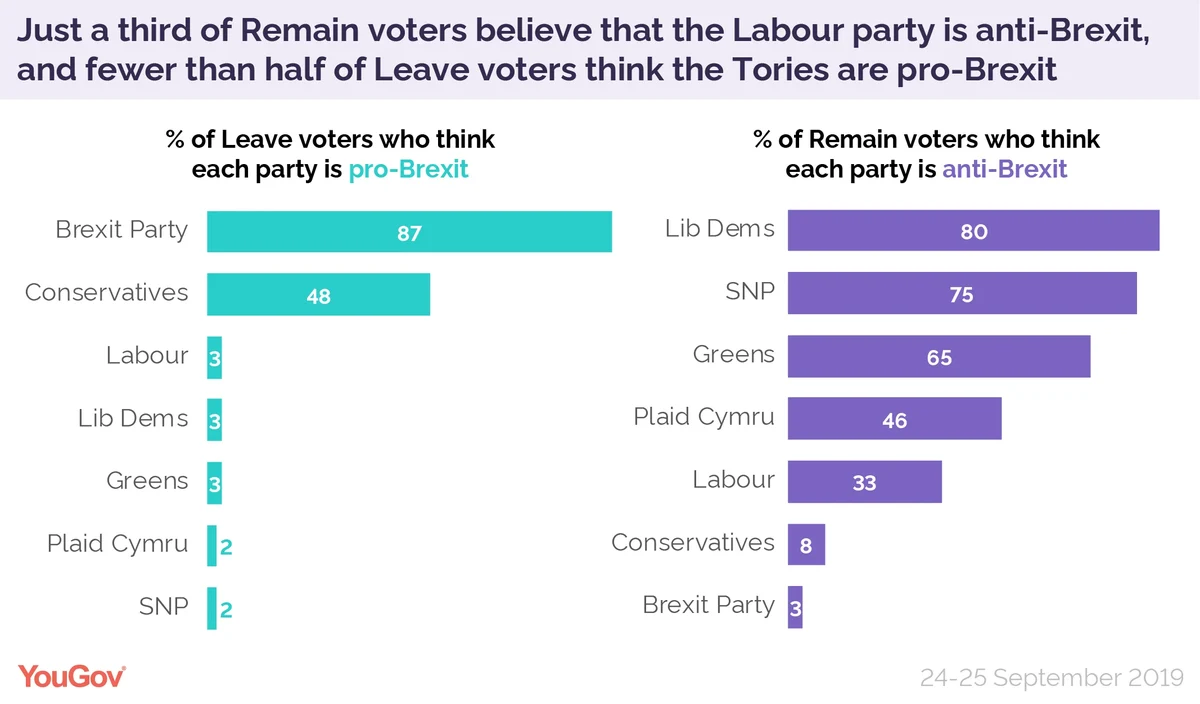People are now more likely to see the Lib Dems as anti-Brexit and the Conservatives as pro-Brexit than five months ago – but Labour has made virtually no progress
A new YouGov study reveals the progress (or lack thereof) which Britain’s parties have made in getting the most fundamental aspect of their Brexit message across to the public: whether they are actually for it, or against it.
Lib Dems
The party that has been most successful in that time is the Liberal Democrats. Back in April, when the first study was conducted, only half of Britons (53%) recognised that the Lib Dems were an anti-Brexit party. Since then this figure has seen a seventeen point increase to 70%, making them the party the public are most likely to recognise as being anti-Brexit (although virtually tied with the SNP on 69%).
With the Lib Dems aggressively pitching themselves as the most anti-Brexit main party in a bid to win over Remain voters at a future election, they will be pleased to know that those who voted against Brexit in 2016 are especially likely to have become clearer on the party’s stance. While a majority of Remain voters (56%) already knew the Lib Dems were anti-Brexit back in April, this figure has since skyrocketed to 80%.
Conservatives
The Conservatives have also seen a noticeable shift in perceptions. In April only a third (37%) of people believed the party to be pro-Brexit. This figure has since increased to 52%, and at the same time the proportion of people believing the party to be anti-Brexit has fallen from 24% to 12%.
Crucially for the party, this shift is most pronounced among Leave voters and 2017 Conservative voters. Back in April, Leave voters were substantially more likely to think the Tories were actually anti-Brexit (40%) than pro-Brexit (23%). Those who had voted for the party in 2017 were likewise split 29%/31% on whether it supported or opposed Brexit. For both groups those figure have swung firmly towards pro-Brexit; in the case of 2017 Tory voters there has been a 27 point increase to 56%, whereas among Leave voters there was been a twenty five point leap to 48%.
Current Brexit Party voters are less likely to see the Tories as pro-Brexit at 34%, although this figure has risen from 9% in April. At the same time, the proportion of Brexit Party voters who think the Conservatives are actively anti-Brexit has fallen from 65% to 24%.
These results could be subject to survivorship bias, as it may be that many of those who previously didn’t think the Tories supported Brexit changed their voting intention when they came to see the party as pro-Brexit, leaving only those who continue to tend to see the party as not being pro-Brexit in this shrunken voting group.
Regardless, these results will be welcome news for the Prime Minister, who has been seeking to convince those who backed Brexit in 2016 that he intends to deliver on the result of the referendum, and knows he needs their votes for the likely forthcoming general election.
Labour
Knowledge of where Labour stands on Brexit has shifted far less dramatically, which will disappoint those within the party who want it to be seen as the leading anti-Brexit movement. In April 42% of Britons believed Labour to oppose Brexit, this figure is now effectively unchanged at 43%.
Worse still for these activists, this figure is propped up by the fact that their enemies are more likely to believe it than their allies. While 58% of Leave voters consider Labour to be anti-Brexit, a mere 33% of Remain voters think the same (in contrast to the 80% of Remain voters who know the Lib Dems are anti-Brexit).
The change that has occurred is a small shift from people thinking the party is actively pro-Brexit (down seven points to 6%) towards believing the party to be neither pro- nor anti-Brexit (up six points to 26%).
With Jeremy Corbyn having declared that he wants Labour’s policy on Brexit to be one of neutrality, this is doubtless encouraging for him.
Other parties
Minor parties the Greens and Plaid Cymru have been able to make more people aware that they are anti-Brexit, with the former receiving a twelve point boost in this regard to 58% and the latter an eleven point increase to 42%. In both cases the change has come from people previously answering “don’t know” when asked where the parties stood on Brexit.
Elsewhere attitudes remain basically the same – people continue to be overwhelmingly aware that the SNP are anti-Brexit (69%, from 65% in April) and likewise that the Brexit Party and UKIP are pro-Brexit (up two points to 81% in the case of the former, unchanged on 71% in the case of the latter).
Photo: Getty
















